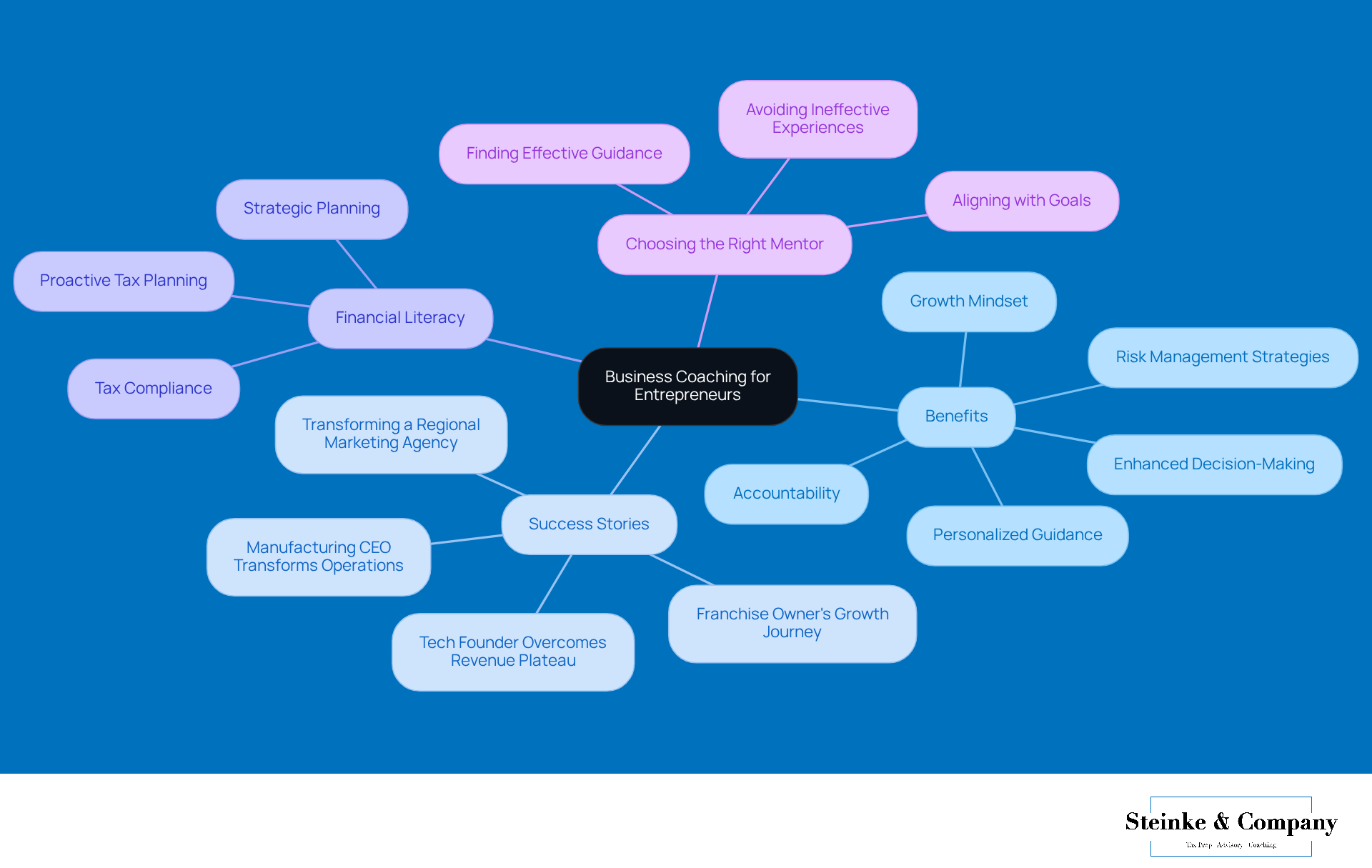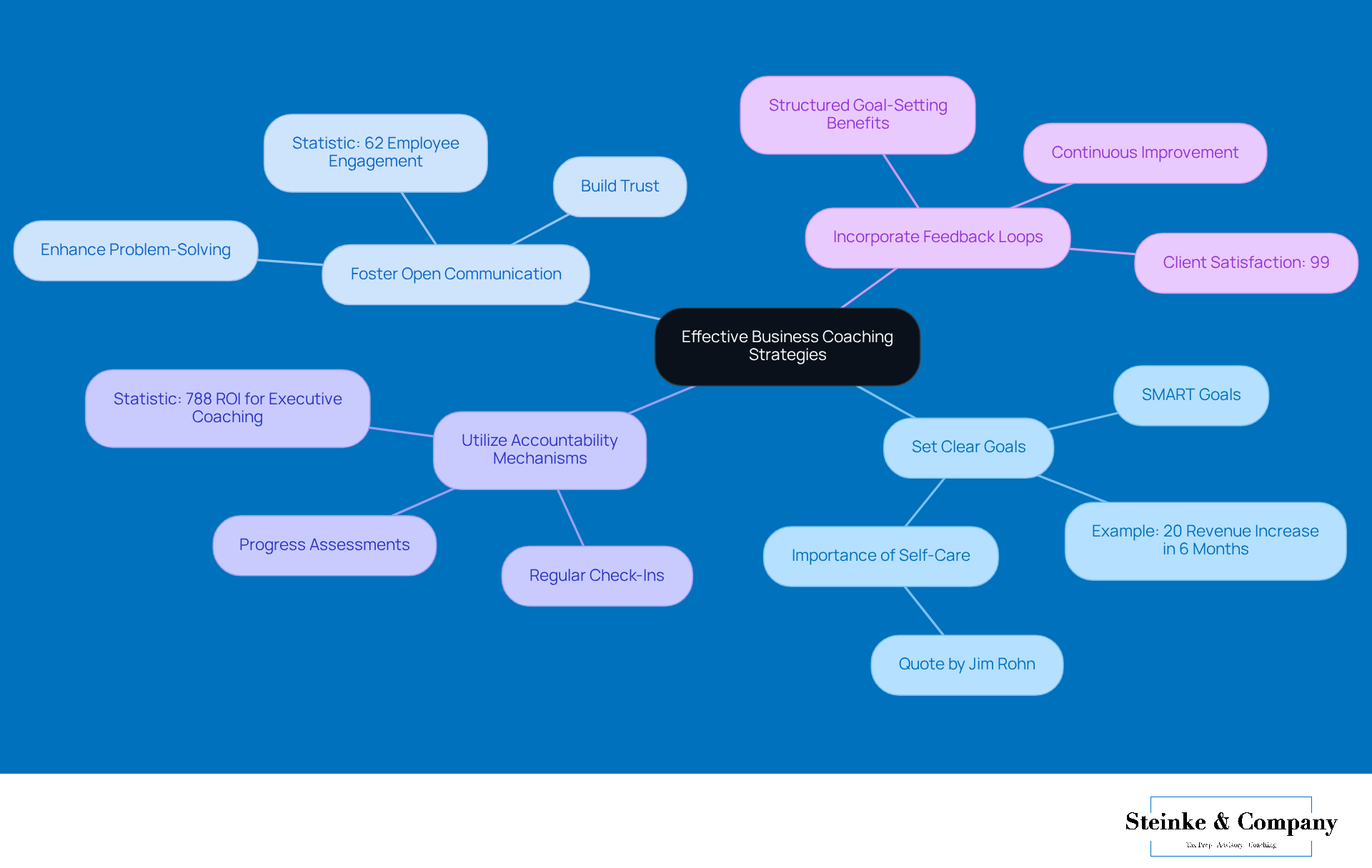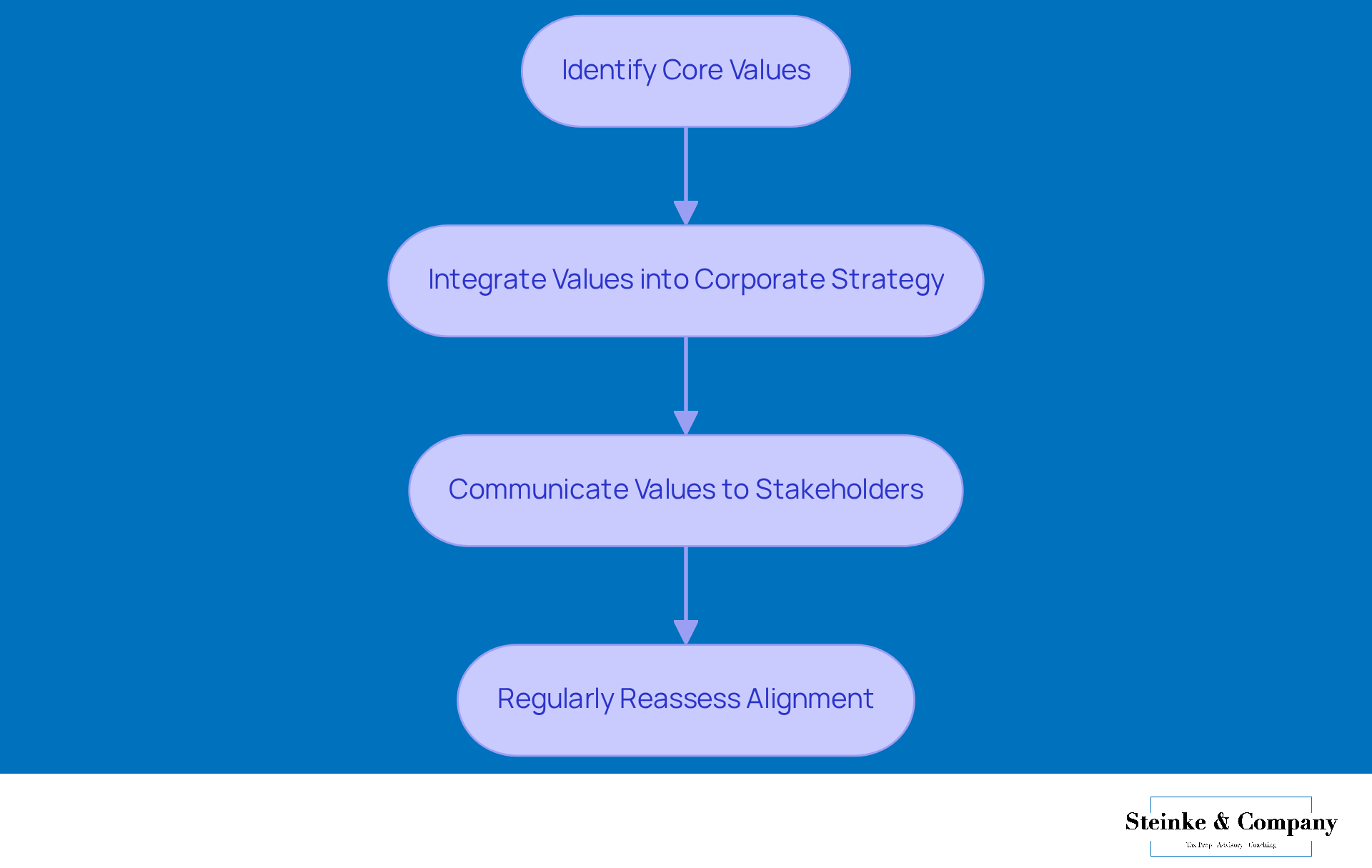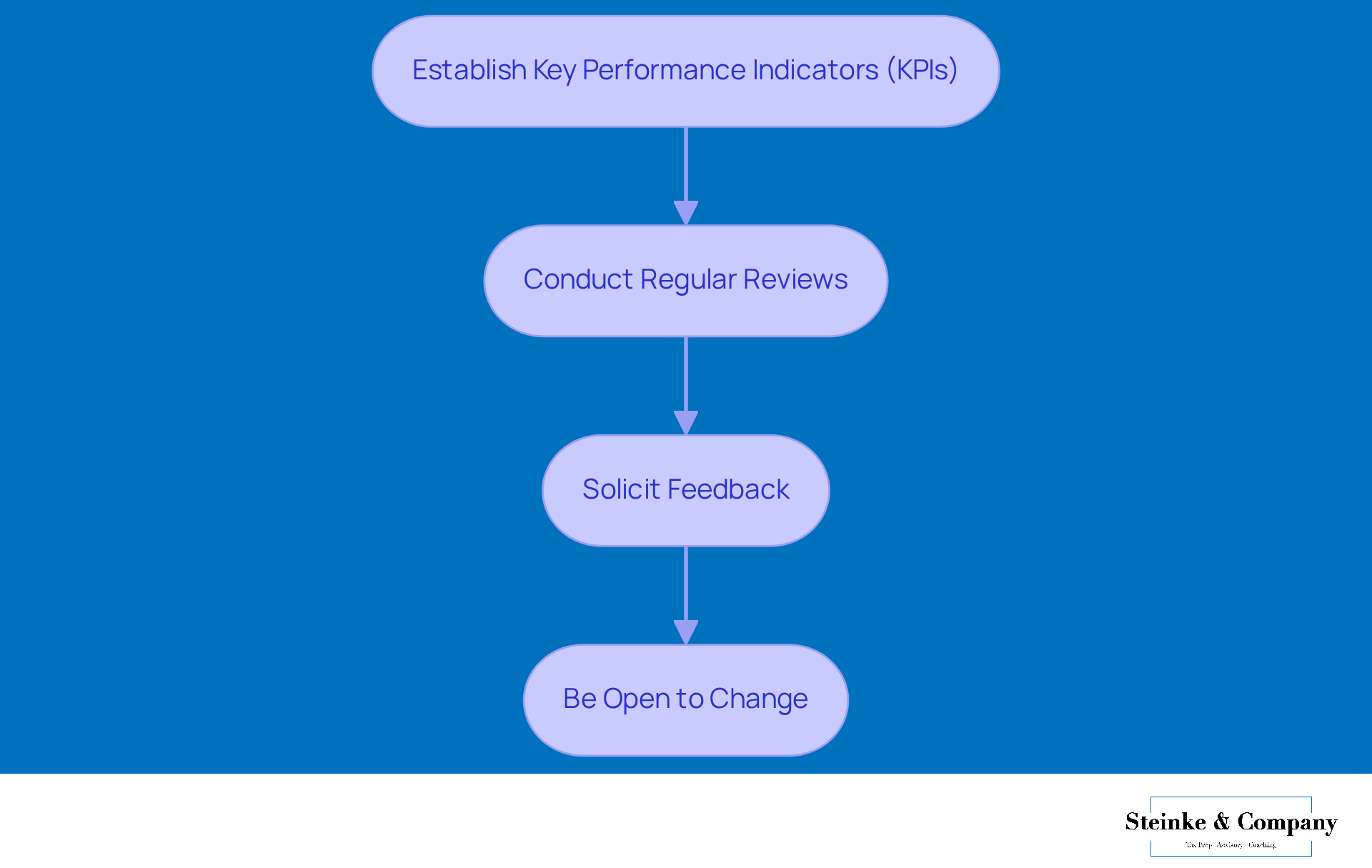Overview
This article highlights four essential best practices in business coaching that can really set entrepreneurs up for success:
- Setting clear goals
- Fostering open communication
- Utilizing accountability mechanisms
- Incorporating feedback loops
These practices aren’t just buzzwords; they’re backed by solid evidence showing that when you have structured goal-setting and regular assessments, you can significantly boost performance and satisfaction. Ultimately, this leads to sustainable growth and effectiveness throughout your entrepreneurial journey.
So, let’s break it down! First up, setting clear goals is like having a roadmap for your business. Without it, you might find yourself wandering aimlessly. Next, fostering open communication creates a culture where everyone feels heard and valued. This is crucial because who doesn’t want to work in an environment that encourages sharing ideas?
Then we have accountability mechanisms. Think of them as your safety net, ensuring that you stay on track. And finally, incorporating feedback loops allows for continuous improvement. It's all about learning and adapting, right?
Incorporating these practices can truly transform your entrepreneurial journey, making it not just effective but also enjoyable. So, why not give them a try and see how they work for you? You might just find that they make a world of difference!
Introduction
In the bustling world of entrepreneurship, business coaching has become a key player in achieving success. Entrepreneurs often juggle a variety of challenges, whether it’s fine-tuning their business strategies or navigating the ever-changing market landscape. That’s where effective coaching steps in, offering personalized support to help tackle these obstacles.
But with so many coaching methods out there, how can business owners make sure they’re choosing the right strategies to reach their goals? Let’s explore four best practices that not only enhance your coaching experience but also help align your personal values with your business objectives, paving the way for sustainable growth and success.
Understand the Role of Business Coaching in Entrepreneurial Success
Business coaching for entrepreneurs is super important for the success of business owners, offering personalized guidance and support tailored to their unique challenges. Business coaching for entrepreneurs helps coaches assist business owners in spotting their strengths and weaknesses, creating actionable plans, and keeping them accountable. By fostering a growth mindset and effective risk management strategies, professional guidance empowers individuals to embrace change, adapt to market dynamics, and sharpen their decision-making skills.
For instance, take a franchise owner who was struggling with moderate growth; she transformed her business through mentorship, refining her brand messaging and developing a repeatable expansion model. This ultimately helped her manage five locations! This holistic approach not only tackles immediate business needs but also prepares owners for .
Moreover, effective business coaching for entrepreneurs can enhance financial literacy, enabling business owners to make informed decisions about tax compliance and strategic planning. At Steinke and Company, our proactive tax planning services ensure that entrepreneurs are not just compliant but also optimizing their financial performance. We meet 1-3 times a year to review tax returns and uncover overlooked opportunities, laying out clear strategies to reduce tax burdens while encouraging growth.
This dual focus on personal and professional development is key to building resilience in a constantly shifting economic landscape. With over 1,000 entrepreneurs and leaders benefiting from our customized business coaching for entrepreneurs, it’s clear: investing in professional guidance is a smart move that can lead to significant performance and growth improvements. However, it’s crucial for business founders to find the right mentor to steer clear of ineffective guidance experiences, ensuring the support they receive is impactful and aligned with their goals.

Implement Key Strategies for Effective Business Coaching
To really make the most of business coaching, entrepreneurs can try out a few key strategies:
- Set Clear Goals: First off, let’s talk about setting specific, measurable, achievable, relevant, and time-bound (SMART) goals. This is super important for guiding the coaching process. When both the business owner and the coach know exactly what they’re aiming for, it makes it easier to focus their efforts. For example, a virtual assistant might set a SMART goal to boost revenue by 20% in six months. That’s a clear target to shoot for! And remember what Jim Rohn said, 'Take care of your body. It’s the only place you have to live.' This really highlights how self-care plays a big role in hitting those business goals.
- Foster Open Communication: Next up, let’s encourage open and honest communication between the entrepreneur and the coach. This builds trust and makes problem-solving and strategy development way more effective. When there’s transparency, it helps everyone understand challenges and opportunities better, which really enhances the mentoring experience. Did you know that 62% of employees in organizations that use mentoring feel highly engaged? That’s a testament to how powerful good communication can be in these relationships.
- Utilize Accountability Mechanisms: are also key to keeping the momentum going and ensuring the entrepreneur stays on track with their goals. Accountability is what drives commitment and motivation, making it easier to tackle obstacles and celebrate wins along the way. A study by MetrixGlobal even found a whopping 788% ROI for executive coaching! That just goes to show how valuable accountability can be in achieving results.
- Incorporate Feedback Loops: Lastly, actively seeking and incorporating feedback from the coach and other stakeholders creates a process of continuous improvement. This adaptability ensures that your strategies remain relevant and effective based on real-world results. Clients who engage in structured goal-setting often see significant improvements in their performance and satisfaction. In fact, 99% of individuals and organizations that hire a coach report being happy with their experience!
By putting these strategies into action, business owners can create a coaching environment that emphasizes business coaching for entrepreneurs, encouraging growth, accountability, and success. And let’s not forget how crucial it is to set those SMART objectives! Studies show that clients who engage in organized goal-setting often experience remarkable improvements in both performance and overall satisfaction. So, why not give these strategies a shot and see how they can elevate your coaching journey?

Align Personal Values with Business Objectives for Lasting Impact
For business owners, aligning personal values with corporate goals is super important for creating a sense of purpose and direction. When business owners act in line with their , they tend to stay dedicated to their goals and make choices that truly reflect their beliefs.
So, how can entrepreneurs achieve this alignment? Here are a few steps to consider:
- Identify Core Values: Take a moment to reflect on your personal principles and how they connect to your organizational practices. This self-awareness can be your invisible compass, guiding your decision-making and planning.
- Integrate Values into Corporate Strategy: Make sure that your organizational objectives mirror these core values. For example, if you’re a therapist, prioritizing client well-being and ethical practices should shine through in your services and marketing strategies.
- Communicate Values to Stakeholders: It’s key to clearly express both your personal and organizational values to employees, clients, and partners. This transparency not only fosters a cohesive culture but also strengthens relationships, boosting trust and collaboration.
- Regularly Reassess Alignment: Don’t forget to periodically check if your operational practices align with your personal values. This reassessment helps you stay true to your mission and adapt to changes. Misalignments can lead to misunderstandings and inefficiencies, which can really slow down progress.
By aligning personal values with organizational goals, you can create a more fulfilling and impactful journey. For instance, a coach might help a client who values community service to develop programs that benefit the community, enhancing both personal fulfillment and professional reputation. Organizations that prioritize value alignment often see greater employee engagement, collaboration, and resilience, which ultimately contributes to overall success.

Evaluate Coaching Outcomes and Adjust Strategies for Continuous Improvement
To keep effective, it's super important to regularly check in on coaching results and tweak your approach as needed. Here’s how you can do it:
- Establish Key Performance Indicators (KPIs): Start by defining some specific metrics to measure your success—think revenue growth, client satisfaction, or even operational efficiency. These KPIs will give you a solid framework for evaluation.
- Conduct Regular Reviews: Make it a habit to schedule periodic reviews to see how you’re doing against your goals and KPIs. This way, you can spot what’s working well and what might need a little extra attention.
- Solicit Feedback: Don’t hesitate to gather input from your coach, employees, and clients. Their insights can be invaluable for understanding how effective your methods are and where you might need to make adjustments.
- Be Open to Change: Embrace the idea of being adaptable. If something isn’t yielding the results you hoped for, it’s perfectly okay to consider a new direction or explore different techniques.
For instance, imagine a business coach teaming up with a client to dive into their marketing strategies. They might discover which channels are hitting the mark and which ones could use a bit of fine-tuning. By continuously evaluating outcomes and adjusting strategies, you can ensure that your business coaching for entrepreneurs remains relevant and impactful, ultimately paving the way for long-term success. So, how often do you check in on your coaching progress?

Conclusion
Business coaching is such a valuable resource for entrepreneurs, offering personalized support that boosts both personal and professional growth. By really getting to know the unique challenges that business owners face, effective coaching helps them pinpoint their strengths, create actionable plans, and stay accountable. This journey ultimately paves the way for lasting success and adaptability in today’s competitive landscape.
Now, let’s talk about some best practices that entrepreneurs can embrace to really get the most out of their business coaching experience. Think about:
- Setting clear SMART goals
- Encouraging open communication
- Using accountability tools
- Aligning personal values with business objectives
Each of these strategies not only enhances the coaching experience but also drives performance improvements and fosters a culture of continuous learning and adaptation.
Incorporating these practices into your coaching journey is crucial for long-term success. It’s a good idea for entrepreneurs to take proactive steps in evaluating their coaching outcomes and adjusting strategies as needed. By doing this, they ensure their business stays true to their core values while also boosting their effectiveness in navigating the complexities of entrepreneurship. Embracing these insights can lead to transformative growth, making the pursuit of business coaching a worthwhile investment in achieving your entrepreneurial dreams!
Frequently Asked Questions
What is the role of business coaching in entrepreneurial success?
Business coaching provides personalized guidance and support to entrepreneurs, helping them identify strengths and weaknesses, create actionable plans, and stay accountable, which is crucial for their success.
How does business coaching help entrepreneurs adapt to market changes?
Business coaching fosters a growth mindset and effective risk management strategies, empowering entrepreneurs to embrace change and adapt to evolving market dynamics.
Can you provide an example of how business coaching has helped an entrepreneur?
A franchise owner struggling with moderate growth transformed her business through mentorship, refining her brand messaging and developing a repeatable expansion model, ultimately managing five locations.
What additional benefits does business coaching offer regarding financial literacy?
Business coaching enhances financial literacy, enabling entrepreneurs to make informed decisions about tax compliance and strategic planning, which helps optimize their financial performance.
How often do business coaching sessions typically occur?
Business coaching sessions typically occur 1-3 times a year to review tax returns and uncover overlooked opportunities, while laying out strategies to reduce tax burdens and encourage growth.
Why is it important for business founders to find the right mentor?
Finding the right mentor is crucial to avoid ineffective guidance experiences, ensuring that the support received is impactful and aligned with the founders' goals.
What is the overall impact of investing in professional business coaching?
Investing in professional business coaching can lead to significant improvements in performance and growth, as evidenced by over 1,000 entrepreneurs and leaders benefiting from customized coaching.




